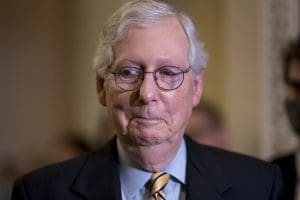McConnell's refusal to raise debt limit could cost 6 million jobs, raise unemployment
Moody’s Analytics found the decision would cause the United States to ‘descend back into recession.’

Senate Minority Leader Mitch McConnell is adamantly refusing to vote to raise the debt ceiling, a move that would cause catastrophic damage to the U.S. economy, a report from Moody’s Analytics released on Tuesday said.
“The debt ceiling will be raised as it always has. But it will be raised by the Democrats,” McConnell said on Tuesday, signaling that Republicans would not help vote to pay for the debts they helped incur.
During former President Donald Trump’s presidency, when Republicans had full control of Congress and the White House, McConnell helped the United States add nearly $7.8 trillion to the national debt.
Without enough votes to raise the debt ceiling, the federal government could default on its debts and be forced to freeze several initiatives that have already received approval from Congress.
“The U.S. and global economies, which still have a long way to go to recover from the recession caused by the pandemic, will descend back into recession,” the Moody’s report reads.
The report said a failure to raise the debt ceiling would cost the economy as much as 6 million jobs and that unemployment would “surge back to close to 9%,” and also warned that the move could also cost nearly $15 trillion in household wealth, thanks to a likely plunge in the stock market.
It’s not just Moody’s that has issued dire warnings.
Two members of the Treasury Borrowing Advisory Committee — which includes members of the country’s banks, hedge funds, and insurance companies — wrote a letter to Treasury Secretary Janet Yellen on Tuesday saying they “are deeply concerned about the market consequences that could arise should Congress fail to raise, suspend, or eliminate the statutory debt limit in a timely manner.”
Beth Hammack, the chair of the committee, and Brian P. Sack, the vice chair, wrote:
It is our considered judgment that near-term action by Congress is required to preserve the tremendous benefits that the U.S. Treasury market provides to taxpayers and to avoid the immense damage a missed payment could have on the Treasury market and U.S. economy.
Democrats are seeking to add an increase in the debt ceiling to a short-term funding bill to prevent the government from shutting down next week, when the current funding bill runs out.
House Democrats passed that funding bill, along with the debt ceiling increase, on Tuesday night. However, not a single House Republican lawmaker voted for the funding bill.
That short-term funding bill now goes to the Senate, where without 60 votes to defeat a filibuster, it will fail — causing both a government shutdown and a default on the national debt.
Democratic lawmakers consistently voted to raise the debt ceiling when Republicans controlled Congress. The last time the debt ceiling was raised was in 2019, when Trump was in office. That passed the Senate on a bipartisan vote of 67 to 28.
And as the GOP digs in with its refusal to pay for the debts they helped the country rack up, Democratic lawmakers are shaming them, as well as the media coverage of the situation.
Sen. Brian Schatz (D-HI) has been one of the most vocal critics of McConnell and Republicans’ position that they bear no responsibility for the debt and don’t need to vote to raise it.
“I’m sick to my stomach that Republicans are explicitly promising to take the country into an economic abyss and many reporters are like ‘How wily! How will Democrats navigate this?'” Schatz tweeted on Tuesday.
On Saturday, he similarly slammed the GOP position.
“The institutional position of the Republican Party is that America should default on its obligations and destroy the economy,” he tweeted. “Republicans are going to try to say they don’t want a default — they just are voting for one. I mean, come on.”
Congress has until sometime in October to raise the debt ceiling, according to the Congressional Budget Office, which is currently using “extraordinary measures” to pay the country’s bills.
Published with permission of The American Independent Foundation.
Recommended

Biden calls for expanded child tax credit, taxes on wealthy in $7.2 trillion budget plan
President Joe Biden released his budget request for the upcoming fiscal year Monday, calling on Congress to stick to the spending agreement brokered last year and to revamp tax laws so that the “wealthy pay their fair share.”
By Jennifer Shutt, States Newsroom - March 11, 2024
December jobs report: Wages up, hiring steady as job market ends year strong
Friday’s jobs data showed a strong, resilient U.S. labor market with wages outpacing inflation — welcome news for Americans hoping to have more purchasing power in 2024.
By Casey Quinlan - January 05, 2024
Biden’s infrastructure law is boosting Nevada’s economy. Sam Brown opposed it.
The Nevada Republican U.S. Senate hopeful also spoke out against a rail project projected to create thousands of union jobs
By Jesse Valentine - November 15, 2023








































































